

C.African army and Russian paramilitary spark panic in two villages: UN source
The Central African Republic's army, accompanied by a Russian paramilitary group, sparked panic earlier this week in the center of the country which prompted some of the population to flee, a UN source in New York told AFP on Friday.
The source, who requested to remain anonymous, added that a contingency of the UN peacekeeping mission in the Central African Republic (MINUSCA) was "blocked" on their way to "investigate and ensure the protection of civilians."
MINUSCA reported on Wednesday that it had "observed movements of Central African armed forces and other security personnel" around the town of Bria, heading toward the nearby villages of Mouka and Samo-Ouandja, the source told AFP.
The UN uses the term "other security personnel" to refer to the hundreds of Russian paramilitary forces who fight alongside the army, and who have helped them over the past year push back rebels from their strongholds.
Western countries as well as the UN have claimed that the paramilitary forces are "mercenaries" working for the Wagner group, a private security company based in Russia, which has been accused multiple times over the past few months of committing human rights violations against civilian populations.
The presence of the military forces "triggered panic and fear among the civilian population, causing displacement," the UN source explained.
On January 21, the UN launched an investigation into a mass killing near Bria in which 30 people were killed during a similar operation to Wednesday's actions by the Central African army and Russian paramilitary forces.
At the end of 2020, a coalition of armed groups -- which at the time controlled nearly two thirds of the Central African Republic's territory -- launched an advance towards the capital Bangui, seeking to oust the president, Faustin Archange Touadera, just before the presidential election.
Touadera narrowly won reelection and called on Moscow to send reinforcements for his fledgling army.
Shortly after, hundreds of paramilitary forces arrived in the war-torn country, which the UN identified as Wagner combatants, but which Moscow has described as "non-armed instructors."
Since then, the Central African army and their allies have taken back most of the country, pushing rebels out of the major cities and their primary footholds.
The rebels frequently unleash guerilla assaults against the security forces as well as civilians.
L.Balcazar--ESF




